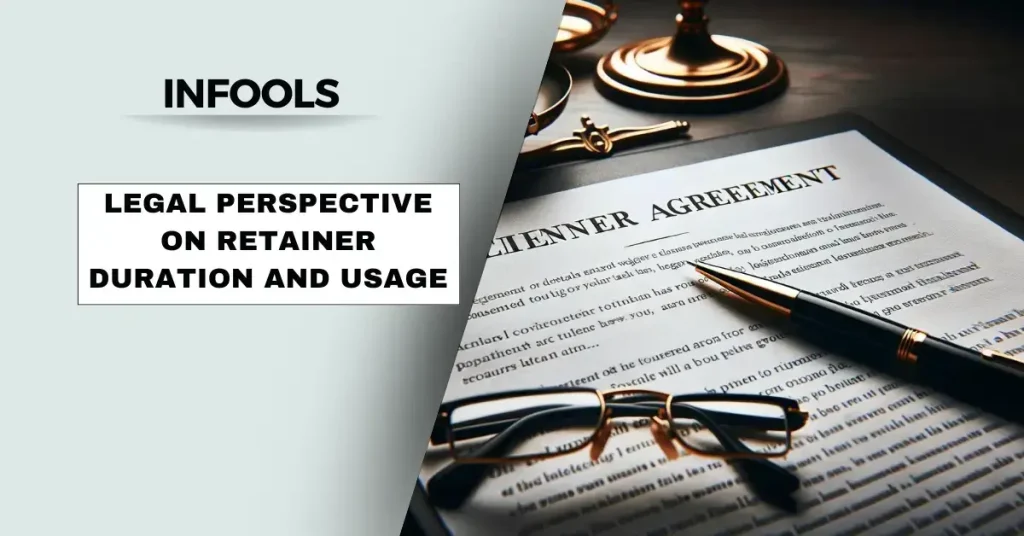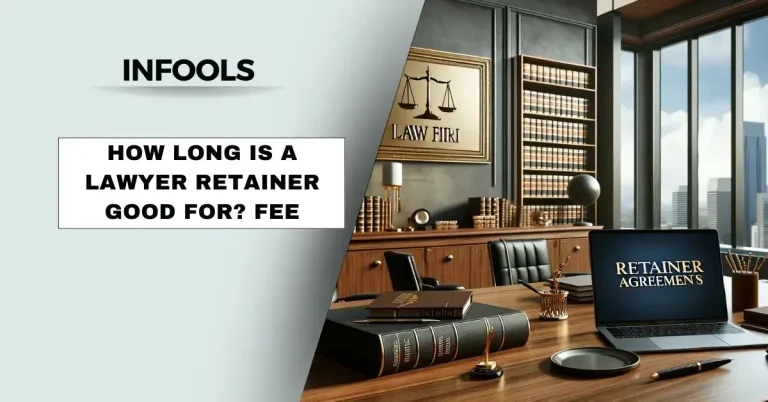“How long is a lawyer retainer good for?” It can vary depending on the specifics of the agreement between the attorney and the client.
Typically, the duration of a lawyer retainer aligns with the scope of the legal services needed and the terms outlined in the retainer agreement.
Some retainers are designed to cover a particular case or project and expire once the legal matter is resolved. Others may be set up for a defined time period such as six months or a year.
Understanding these details is crucial for clients to manage their legal representation effectively and ensure they have the necessary support throughout the duration of their legal matters.
KEY POINTS
- Retainer Duration: The duration varies based on agreement specifics and case complexity.
- Types of Retainers: Includes upfront, unearned, and earned, each with specific usage guidelines.
- Billing Methods: Retainers offer predictable costs and readiness, unlike variable hourly billing.
- Funds Management: Retainer fees are held in trust and regulated, with transparent accounting.
- Renewal Needs: Retainers may be replenished or extended as legal needs persist.
Table of Contents
Understanding Retainer Fees: What You Need to Know
What is a Retainer Fee?
A retainer fee is essentially a prepaid amount paid to an attorney to secure their services for legal matters.
This fee is held in a trust account and is used to cover the costs of legal services as they are rendered.
Retainers are commonly employed in the legal field to ensure that the attorney is compensated for their availability, regardless of whether their services are extensively used.
Types of Retainer Fees
Retainer fees are generally categorized into three types:
- Upfront Retainers: These are initial payments made to a lawyer that are used to pay for immediate legal services. They act as a deposit from which hourly legal fees are deducted as the lawyer works on the case.
- Unearned Retainer Fees: These fees are paid in advance but are not earned until the lawyer actually performs legal services. This type ensures that funds are available for future legal work.
- Earned Retainer Fees: This type is immediately earned upon payment because it compensates the lawyer for being available to the client, rather than for the execution of specific legal tasks.
Retainer Fees: One-Time or Recurring Expense?
The nature of the retainer fee depends largely on the agreement between the client and the attorney.
Some retainers are one-time fees for specific cases, while others may be topped up regularly, akin to a subscription for ongoing legal services.
The specifics are usually detailed in the retainer agreement, which outlines how and when the retainer needs to be replenished.
How Long Is A Lawyer Retainer Good For? Duration of Lawyer Retainers: Key Factors
Determining Duration of How Long Is A Lawyer Retainer Good For?
So, how long is a lawyer retainer good for, the duration of a lawyer retainer can vary significantly based on several factors:
- Complexity of the Legal Matter: More complex cases often require more time and legal work, thus extending the duration of the retainer.
- Client’s Legal Needs: Frequent legal requirements or ongoing advice may lead to longer retainer periods.
- Lawyer’s Billing Practices: Some lawyers may deplete retainers quickly based on their hourly rates or the demands of the legal work involved.
Terms of the Retainer Agreement
The retainer agreement plays a crucial role in defining the lifespan of a retainer. This contract should clearly state:
- Duration of the Agreement: Specifies how long the retainer is intended to last before requiring renewal or topping up.
- Usage of the Retainer: Details on how the retainer will be applied towards legal fees, expenses, and other charges.
- Renewal Conditions: Conditions under which the retainer agreement can be extended or renewed, depending on the evolving needs of the client and the ongoing nature of legal services.
Read MOre: What Happens After Your Lawyer Sends a Demand Letter?
Retainer Agreements Explained
The Essentials of Retainer Agreements
A retainer agreement is a contract between a client and an attorney that outlines the terms of the legal services to be provided.
This agreement is critical because it sets expectations for both parties and provides a framework for the financial and operational aspects of the legal relationship.
Legal Standing of Retainer Agreements
Legally, retainer agreements must be clear, fair, and enforceable under state law. They protect both the client’s interests by ensuring the availability of the lawyer and the lawyer’s interests by providing guaranteed payment for future services.
The agreement should specify the scope of services, payment terms, and the duration of the retainer.

Difference Between Retainer and Hourly Billing
Retainer Billing
In retainer billing, the client pays upfront for the anticipated work. This method is beneficial for clients who need ongoing legal services. It ensures that the lawyer prioritizes their case and is available when needed.
Hourly Billing
Unlike retainer billing, hourly billing charges clients for each hour or fraction of an hour that the lawyer works on their case.
This can be more cost-effective for clients with less complex legal needs but lacks the predictability and upfront financial commitment of retainer billing.
Financial Dynamics of Retainers
Understanding Retainer Fees
Retainer fees vary widely depending on the law firm, the complexity of the case, and the expertise of the attorney.
They may range from a few thousand to tens of thousands of dollars. Clients should understand what the retainer fee covers and whether any unused portion of the fee will be refunded.
Management of Retainer Accounts
Lawyers typically deposit retainer fees into a special trust account. They withdraw from this account as work is completed and fees are earned.
This process is strictly regulated to ensure fairness and transparency. Clients receive detailed billing statements showing how the retainer is being used.
Legal Perspective on Retainer Duration and Usage
Retainer Lifespan and Legal Norms
The duration of a retainer can vary. Some retainers are project-specific and expire at the end of the case, while others are renewable annually or as agreed.
Legal norms require that retainer agreements be clear on how long the funds are valid and under what conditions additional payments may be necessary.
Case Complexity and Retainer Duration
The complexity of the case often dictates the retainer’s duration. More complex cases may require ongoing support, leading to extended or additional retainers.
It’s important for clients to discuss their case details with their attorneys to estimate how long their retainer will last.
Conditions for Retainer Extension
Retainers may need to be topped up or extended if the case takes longer than expected or if new legal issues arise. These conditions should be clearly outlined in the retainer agreement to avoid any surprises.

What are the Risks and Benefits of Having a Lawyer on Retainer
Benefits
- Immediate Access to Legal Assistance: Having a lawyer on retainer means you have immediate access to legal advice whenever necessary.
- Budget Predictability: Retainer fees make legal expenses predictable, helping clients budget for legal services.
Risks
- Unused Services: If the legal services are not fully utilized, clients may feel they are not getting full value from their retainer.
- Dependency on a Single Lawyer: This might limit options if the retained lawyer does not meet the client’s evolving needs.
FAQs – How long is a lawyer retainer good for?
Do Retainer Fees Expire?
Retainer fees themselves do not typically expire; however, the specific terms of the retainer agreement may dictate when unused funds need to be returned to the client or if they can be carried over into a new period. It’s important for clients to review their retainer agreements for specifics about the expiration of funds.
How Long is a Retainer Contract?
The duration of a retainer contract varies depending on the agreement between the client and the attorney. Some retainers are set for a specific period, such as six months or a year, while others may be project-based and conclude once the legal matter is resolved.
Is a Retainer Fee Refundable?
Whether a retainer fee is refundable depends on the terms of the retainer agreement. Generally, unearned retainer fees, which are funds not yet used for legal services, must be returned to the client. Clients should ensure this term is clearly outlined in the agreement.
Should one consider Extending or Renewing a Lawyer Retainer?
Clients should consider extending or renewing their retainer if:
- The legal issue continues beyond the initial term of the retainer.
- New legal issues arise that require ongoing legal support.
To extend a retainer, clients should:
- Review the current retainer agreement to understand the terms related to extensions.
- Discuss with the lawyer the need for continued services and negotiate the terms of the extension.
Is a retainer a one-time fee?
No, a retainer is not necessarily a one-time fee. While some retainers are paid once for a specific case or legal matter, others may be structured as ongoing payments. These ongoing or recurring retainers are used to secure an attorney’s services over a longer period, requiring the client to replenish the retainer at regular intervals or as the funds are depleted through legal work. The specifics of whether a retainer is a one-time or recurring fee depend on the agreement between the client and the attorney, tailored to the nature of the legal services required.
Conclusion: How long is a lawyer retainer good for?
By now, you must have captured a good image of How Long Is A Lawyer Retainer Good For? So, To make the most of a lawyer retainer, clients should:
- Clearly understand the terms of the retainer agreement.
- Regularly communicate with their attorney to monitor the retainer balance.
- Discuss any concerns about the retainer usage or duration promptly.
By following these steps, clients can ensure they receive valuable legal services and their retainer fee is well-utilized, aligning with their legal needs and expectations.

Morgan Lee is a legal expert specializing in civil rights and corporate law. A graduate from a prestigious law school, Morgan is known for their clear and engaging analysis of complex legal issues, helping readers understand and appreciate the intricacies of law.

